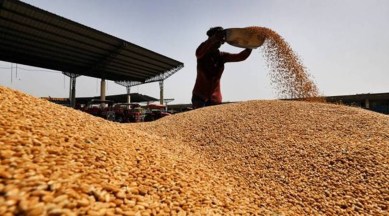Stay updated with the latest - Click here to follow us on Instagram
Discontinuing sale of OMSS grains to states more aimed at curbing price rise, not any particular state: Centre
Amid concerns over monsoon, climate change and the geopolitical situation, the FCI has to maintain enough stocks for undertaking timely market intervention to keep prices under control and discontinuing grains under OMSS to state governments is one such decision taken in that direction.

As a political row kicked off over the move to disallow states from buying foodgrains from the Food Corporation of India (FCI), the central government on Thursday said the decision was more aimed at curbing the price rise, not at any particular state.
The Congress-ruled Karnataka government, which is hard hit by the decision, has accused the central government of going back on its commitment and deliberately preventing it from implementing the state scheme.
monthly limit of free stories.
with an Express account.
Besides Karnataka, Tamil Nadu, Odisha, West Bengal, Chhattisgarh and Telangana are some of the states that would be impacted by this decision.
On June 13, the Union Food Ministry discontinued the sale of rice and wheat under the Open Market Sale Scheme (OMSS) to all state governments, barring northeast, hilly states and those facing law and order situations and natural calamities.
“The decision was not taken suddenly. It was not deliberate. The order came on June 13 after long inter-ministerial consultations. So, it was not a sudden decision for a particular state, it was for the whole country,” Subhod Kumar Singh, Additional Secretary in the Food Ministry, said in a press conference.
It was taken mainly for controlling the prices of essential commodities — wheat and rice in the larger interest of the people. Prices of rice and wheat have shown an upswing in mandis recently, he said.
Amid concerns over monsoon, climate change and the geopolitical situation, Kumar said the FCI has to maintain enough stocks for undertaking timely market intervention to keep prices under control and discontinuing grains under OMSS to state governments was one such decision taken in that direction.
Stating that the Centre decides how to use the FCI stock in the larger interest of the society, Singh said the central government is already providing free foodgrains via ration shops to about 80 crore poor enrolled under the National Food Security Act (NFSA). There are about 40-50 crore non-NFSA beneficiaries from the middle and upper middle class and the government has a responsibility towards them also.
To ensure 40-50 crore non-NFSA people get foodgrains at affordable prices in the market, the government has discontinued the sale of rice and wheat under the OMSS to state governments. It will offload these grains to small private bulk buyers for general consumption from month-end, he said.
Kumar further said: “We need FCI stock for the market intervention…If 3-4 states demand more grains for their schemes, the whole stock will be diverted to these 3-4 states. How we will control prices throughout the country? That will be a problem”.
Asked why the states were not consulted on discontinuing the grains under OMSS, Kumar said, “Any state if they announce any scheme, they also don’t consult us. No state consults and asks whether you will supply foodgrains for this scheme or not. The states announce on their own, and GoI announces on the basis of the stock it has. If we do not have the stock we do not announce the scheme”.
So, the Centre never consults state governments on OMSS. The central government stocks are meant for the central schemes. The government takes decisions from time to time, depending on the stock position and the requirement in the country, he explained.
“The present decision regarding OMSS is for other than 80 crore NFSA beneficiaries to get essential commodities at affordable prices.” Asked why the FCI officer in Karnataka had permitted the lifting of grains under OMSS to the state government on June 12 but a day later withdrew the same, Kumar said, “There was no information regarding this decision on June 12. FCI and its field officers were informed only on June 13”.
Elaborating more, FCI Chairman and Managing Director Ashok K Meena said the prices of rice and wheat have started rising since June. For the next 9-10 months, the government has to keep on intervening in the market to check prices because the next wheat crop will arrive only in April 2024.
Normally, OMSS was operationalised for one-two months, but this year it will be implemented for a longer duration and the FCI, therefore, has to preserve the stock, he said.
Presently, the FCI has a total foodgrains stock of 573.92 lakh tonne against a buffer requirement of 411 lakh tonne as on July 1, he said, adding that the OMSS operation will be implemented in such a manner that the retail prices are controlled.